1985 was the year that Leslie Wexner became a billionaire. It was also that year that the chairman of The Limited (now L Brands) began to build up his public persona. This effort to “re-brand” himself began with a series of fawning media profiles. The main outlets that participated in Wexner’s first main, personal PR campaign were written by prominent New York City-based outlets, like New York Magazine and the New York Times.
The New York magazine profile, which was the cover story for its August 5, 1985 issue, was entitled “The Bachelor Billionaire: On Pins and Needles with Leslie Wexner.” Though filled with photos of a middle-aged Wexner grinning and embracing friends as well as lavish praise for his business dealings and his “tender” and “gentle” personality, one of the main themes of the article revolves around what is apparently a spiritual affliction or mental illness of Wexner’s, depending on the reader’s own spiritual persuasion.
The New York Magazine article opens as follows:
“On the morning Leslie Wexner became a billionaire, he woke up worried, but this was not unusual. He always wakes up worried because of his dybbuk, which pokes and prods and gives him the itchiness of the soul that he calls shpilkes [“pins” in Yiddish]. Sometimes he runs away from it on the roads of Columbus, or drives away from it in one of his Porsches, or flies from it in one of his planes, but then it is back, with his first coffee, his first meeting, nudging at him.”
One may interpret this use of shpilkes, literally “pins” or “spikes” in Yiddish and often used to describe nervous energy, impatience or anxiety, as Wexner merely personifying his anxiety. However, his decision to use the word dybbuk, which he does throughout the article, is quite significant. Also notable is how Wexner goes on to describe this apparent entity throughout the article and his intimate relationship with it.
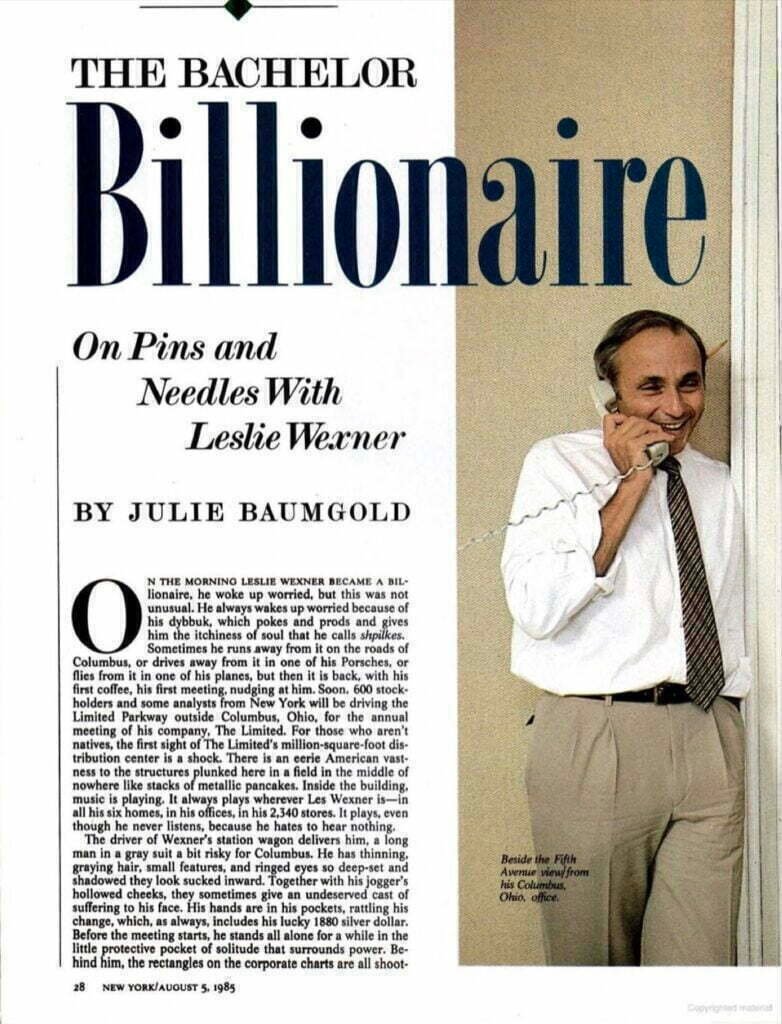
As defined by Encyclopedia Britannica, a dybbuk is a Jewish folklore term for “a disembodied human spirit that, because of former sins, wanders restlessly until it finds a haven in the body of a living person.” Unlike spirits that have yet to move on but possess positive qualities, such as the maggid or ibbur, the dybbuk is almost always considered to be malicious, which leads it to be translated in English as “demon”. This was also the case in this New York magazine profile on Wexner.
The author of that article, Julie Baumgold, describes Leslie Wexner’s dybbuk as “the demon that always wakes up in the morning with Wexner and tweaks and pulls at him.” Wexner could have easily chosen to frame the entity as a righteous spirit (maggid) or as his righteous ancestors (ibbur) guiding his life and business decisions, especially for the purpose of an interview that would be read widely throughout the country. Instead, Wexner chose this particular term, which says a lot for a man who has since used his billions to shape both mainstream Jewish identity and leadership in both the US and Israel for decades.
As the article continues, it states that Wexner has been with the dybbuk since he was a boy and that his father had recognized it and referred to it as the “churning”. Per Wexner, the dybbuk causes him to feel “molten” and constantly pricked by “spiritual pins and needles”. It apparently left him at some point as a young man, only to return in 1977 when he was 40, half-frozen during an ill-fated trip up a mountain near his vacation home in Vail, Colorado. This specific trip is when Wexner says he both rejoined with his childhood dybbuk and decided to “change his life.”
He told New York magazine that his dybbuk makes him “wander from house to house”, “wanting more and more” and “swallowing companies larger than his own.” In other words, it compels him to accumulate more money and more power with no end in sight. Wexner later describes the dybbuk as an integral “part of his genius.”
Wexner further describes his dybbuk as keeping “him out of balance, emotionally stunted, a part of him — the precious, treasured boy-son part — lagging behind [the dybbuk].” This is consistent with other definitions of the term in Jewish media, including a feature piece published in the Jewish Chronicle. That article first defines the term as “a demon [that] clings to [a person’s] soul” and then states that: “The Hebrew verb from which the word dybbuk is derived is also used to describe the cleaving of a pious soul to God. The two states are mirror images of each other.” Per Wexner’s word choice and his characterization of what he perceives as an entity dwelling within him, the entity — the dybbuk — is dominant while his actual self and soul “lags behind” and is stunted, causing him to identify more with the entity than with himself.
This is also reflected in the concluding paragraph of the New York magazine article:
“Les Wexner picks up his heavy black case and flies off in his Challenger, with his dybbuk sitting next to him, taunting and poking him with impatience, that little demon he really loves. The dybbuk turns his face. What does he look like? ‘Me,’ says Leslie Wexner.”
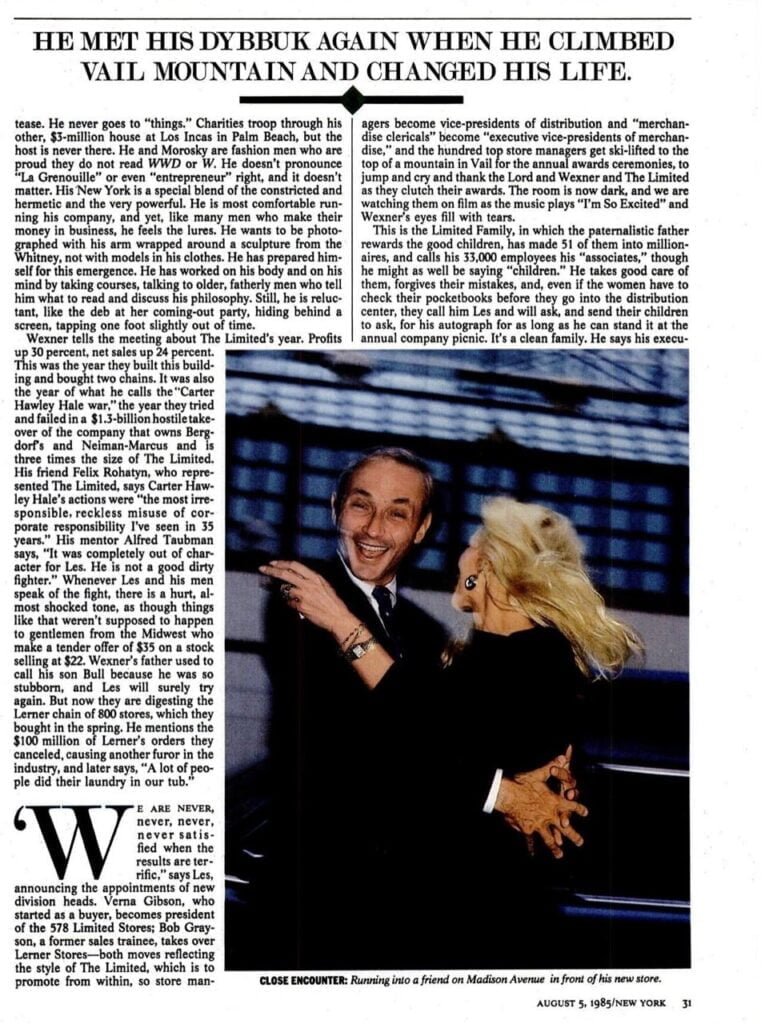
Outside of the spiritual aspect of this discussion, it can also be surmised from the above that there is a strong possibility that Wexner suffers from some sort of mental disorder that causes him to exhibit two distinct personalities which continuously battle within him. What is astounding is that he describes this apparent affliction to a prominent media outlet with pride and the author of the piece weaves Wexner’s “demon” throughout a piece that seeks to praise his business acumen above all else.
Yet, perhaps the most troubling aspect of Wexner’s experience with his “dybbuk”, whether real or imagined, is the fact that Wexner, in the years before and after this article was published, has had a massive impact on Jewish communities in the US and beyond through his “philanthropy.” Some of those philanthropic efforts, like the Wexner Foundation, saw Wexner mold generations of Jewish leaders through Wexner Foundation programs while others, such as the Mega Group, see the organized crime-linked Leslie Wexner joined by several other like-minded billionaires, many of which also boast considerable organized crime connections, in an effort to shape the relationship of the American Jewish community, as well as the US government, with the state of Israel.
For a man of such influence in the Jewish community, why has there been essentially no questions raised as to Wexner’s role in directing the affairs of that ethno-religious community given that he has openly claimed to be guided by a “dybbuk”? This is particularly odd when one considers that Wexner has come under increased scrutiny in recent years after his protege and closest associate for decades, Jeffrey E. Epstein, was outed as both a pedophile and serial sex trafficker. Did Wexner’s dybbuk draw him to Epstein and prompt him to financially support his horrific crimes against minors?
Note: The above is an adapted excerpt from Whitney Webb’s upcoming book “One Nation Under Blackmail: the sordid union between Intelligence and Organized Crime that gave rise to Jeffrey Epstein”. Those interested may pre-order the book directly from the publisher’s website or from Amazon.
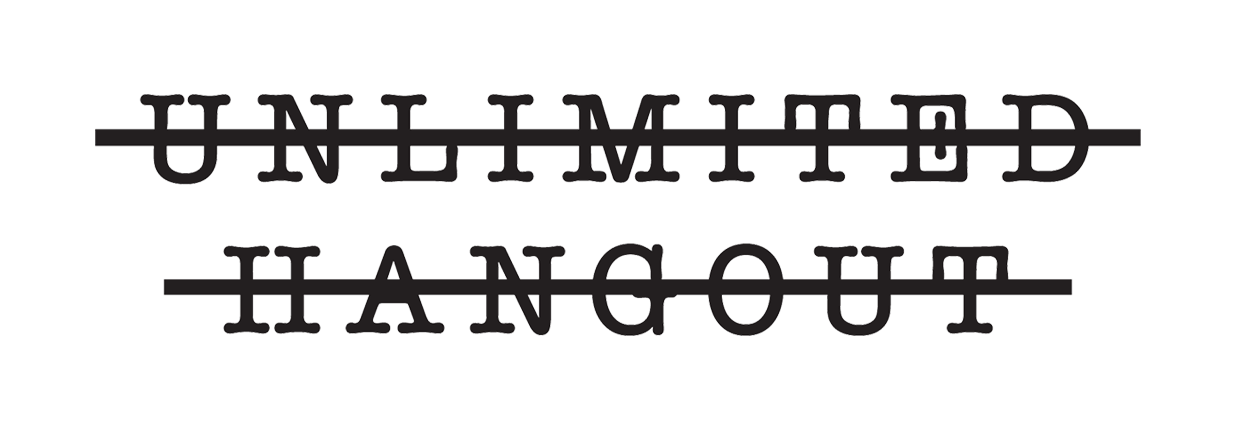
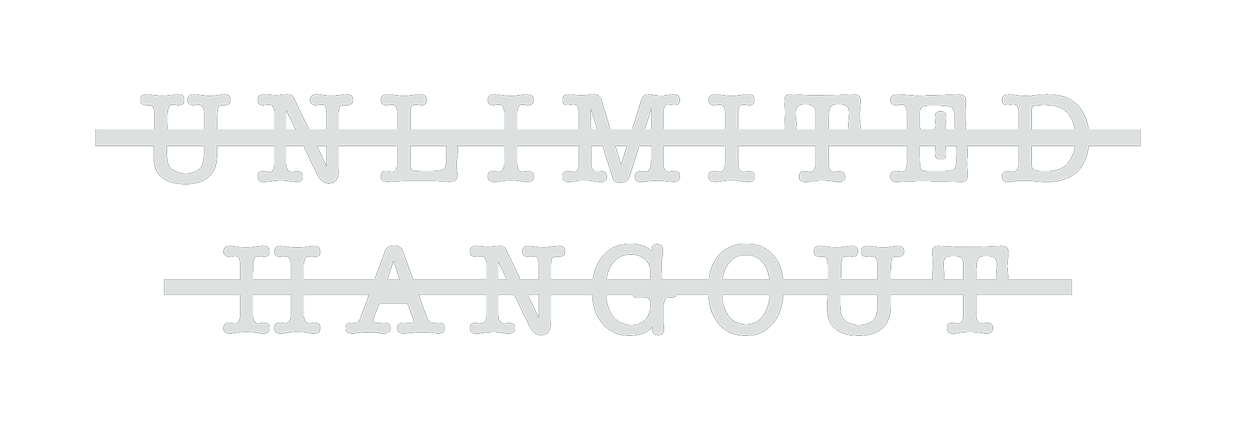




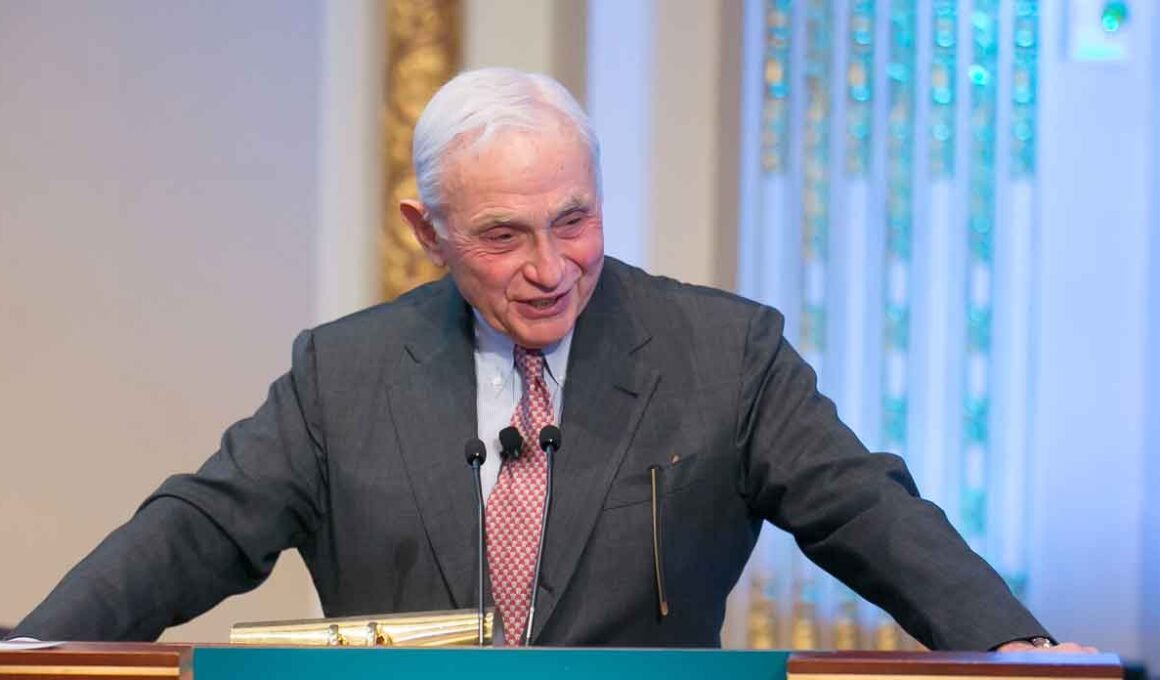




Eh—Wexner’s a psychopath. Or meshuga (crazy) as they say in Yiddish.
Excellent Whitney! Dybbuk! At last a name to the face and feeling. Can’t wait for the book!
Can’t wait to read the full book, any idea when it will be published?
I am so looking forward to the release!
As per usual, billionaire ‘philanthropy’ comes with strings attached.
Les is clearly with the super powerful homosexual mafia. Victoria’s Secret is highly profitable. The homosexual mafia owns it NOT Jewish mafia. Why you say? Cuz the homosexual mafia occuppies the tippidy top of the power pyramid. As a New Yorker, I watched these two mafias square olff against one another. The homosexual mafia won. Certain compromises were reached afterwards. Dominant Jews were eliminated, submissive Jews welcomed into the fold. Wexner sure looks like one of the submissive Jews.(the pics submitted here show a boyish innocence no menacing dominant) Wandering Jews have, for centuries, learned to cope with their host country’s rules. No different today.
Brilliant, as usual. I’ve missed your writing. Can’t wait til the book is published. Best regards!
You are developing such an important perspective from which to view psychocultural disease and its delusion-greed-malice vectors of illness. Looking forward to more…
Dybbuk sounds kinda like (misspelling intentional) cooovid backwards. Demonic. I have encountered this backwards reading of the word many times by many people. It fits in more ways than one. Especially now.
In a number of pictures available on Google Images, it’s quite striking how evil Les Wexler looks. This may be a subjective assessment – besides, not all evil people look evil. But he truly does. Maybe there’s some truth to the Dybbuk story.
Here is an interesting link between Dybbuk and COVID:
https://bogdanherzog.ro/on-the-occult-meaning-of-the-term-covid-a-succinct-incursion-into-pattern-recognition/
The ego is a compulsive or driven sense of self.
The context is well described here:
https://www.christmind.info/t/acim/text/04/chap0405/
The assignment of demonic to a conflicted sense of self can be specifically framed in some instances, such as to shape the charge of its expression.
While this can take extreme forms, the practical key is in recognising & releasing our own reactive or driven behaviour to a true and present discernment.
Insanity in fact is a dissociated or deluded state, where insanity relative to current cultural social definitions can accuse its own ‘sins’ in the sane, the healthy, and the messengers or witnesses to wholeness.
The ‘mass psychosis’ is just such a collective masking against inner ‘demons’ that personify according to the individual patterns of separation trauma. The key is in allowing the undoing of a mindset that persists the ‘problem’ in false solutions, that repackage and mask toxic debts in complex packages of promised gain or virtue.
well said.
It is definitely real.
I would say that he admits to demonic possession.
There are the ones so totally possessed that they don’t even know it that they are used as an instrument.
I will check out the link, I have been very interested in demons lately
Nice job, Whitney.
I know this comment probably won’t make it on your forum…
But (((Leslie Wexner))) and (((Jeffrey Epstein))) are neanderthal cousins. They ALL look out for their tribal interests.
Until THIS fact is addressed, that same cabal of self-chosen elitists will continue to implement policies aimed at the total destruction of Western Civilization.
Perhaps his ancestors have enslaved their progeny to Molock and, to take no joy in life other than acquisition of the family wealth and power. If so, it was a crime against the natural order.
Why has your book on Epstein been delayed again and now there is no revised publication date? When is it coming out?
Would there be a group of entities controlling for some purpose how far through Erik Erikson’s eight stages of human development that people targeted for shorter lives proceed? And why and wherefor?
For an additional perspective and interpretation of instances when Wexner uses the term “dybbuk”, one can probably substitute it with “addiction” or “urges”. This substitution doesn’t fully encompass the gravity of what he divulged, but I think it serves as a useful way to focus on a particular aspect of it.
I also think we can substitute “intrusive thoughts” for Les’s father’s term “churning”, with reasonable accuracy.
It appears that Les was possibly conflicted in his childhood between alleviating his intrusive thoughts by satisfying his urges, or keeping them contained because satisfying his urges may result in consequences (ie: punishment) from those who could exert power over him (ie: his parents or school teachers). Therefore, he possibly was stuck between wanting to satisfy his urges, but also not wanting to be punished… this is an important point that I will tie into his evolution further down.
A key aspect of sociopaths, which Wexner all but certainly (sans an official evaluation by a professional) fits, is their lack of empathy and inability to feel remorse. If I accidentally bump into an elderly person in a mall, I’ll feel very bad and ask them if they were hurt and offer an apology. If a sociopath tortures someone, they will stop only once they’re satisfied; the victim’s excruciating agony (that makes my head spin even just thinking about it as I type this) provides pleasure and excitement to a sociopath. It’s beyond sick; it’s evil.
Next, Wexner apparently knows enough, from an intellectual standpoint, that his urges and addiction is considered wrong by society. It doesn’t *feel* wrong for him, but he knows there are laws against doing what satisfies his cravings. Henceforth, he continues to be conflicted with the consequences of breaking the law, and decides to keep his urges in check. Apparently, as a young adult, he was more motivated by not ending up with legal trouble than he was by satisfying his desires… if we are to believe what he suggested. Personally I would interpret what he said to mean that he stuck to satisfying his urges in ways that would most likely avoid legal consequences, rather than ‘going all out’ and satisfying his urges in a fashion that he truly yearned for.
What happened around age 40? This is when the power differential probably changed for him. As I mentioned earlier, his possible conflict between acting out to satisfy his urges and wanting to avoid punishment from his parents or teachers, didn’t really hold permanent consequences because he was a minor. As he became a young adult, however, he probably realized (by experience or otherwise) that it was the law that he would be up against, and not a grounding from his parents. This likely kept him in check to a degree, and again he probably satisfied his urges in a more “cautious” way. But around the age of 40 he probably reached the point where he amassed enough wealth and power that he effectively became untouchable by the law… hence he reunited with his dybbuk in full force, and began to satisfy his sickest desires with no limits.
Lastly, as a bit of a tangent, I wouldn’t be surprised if his mountain climbing expedition in Vail Colorado had to do with occult practices. I’ve read much of Levenda’s works and they shine a million spotlights on what’s going on with the elites, and has been for a very, very long time. I have also started to make my way through Heiser’s works on incorporating the mindsets of the individuals who originally wrote various religious texts, when interpreting those texts. In many instances he stressed how supernatural (good, and evil) meetings frequently took place on the tops of mountains, closer to where the entities were perceived to come from (the sky). I think it isn’t too much of a stretch to suggest that Wexner might have had occult and/or supernatural ambitions when he climbed that mountain… especially since he marked that as the pivotal moment in his life when his *dybbuk came back in full force.*
Please keep in mind that much of what I wrote above is speculative. My intent is to brainstorm ideas and possibilities that likely bare some weight, but need to be further researched.
Rumors that Wexner was a financier of the 9/11 attacks. Maybe you can find something.
When a man tells you he’s possessed by a demon, BELIEVE him. They do exist, just like hell exists, just like heaven exists.
Turn to Jesus. Get right with God.
He is SO tortured by Dybbuk he felt the need to OUT it in the New York magazine article to suffocate it……maybe the woman who wrote the article also laced it with some encatations?